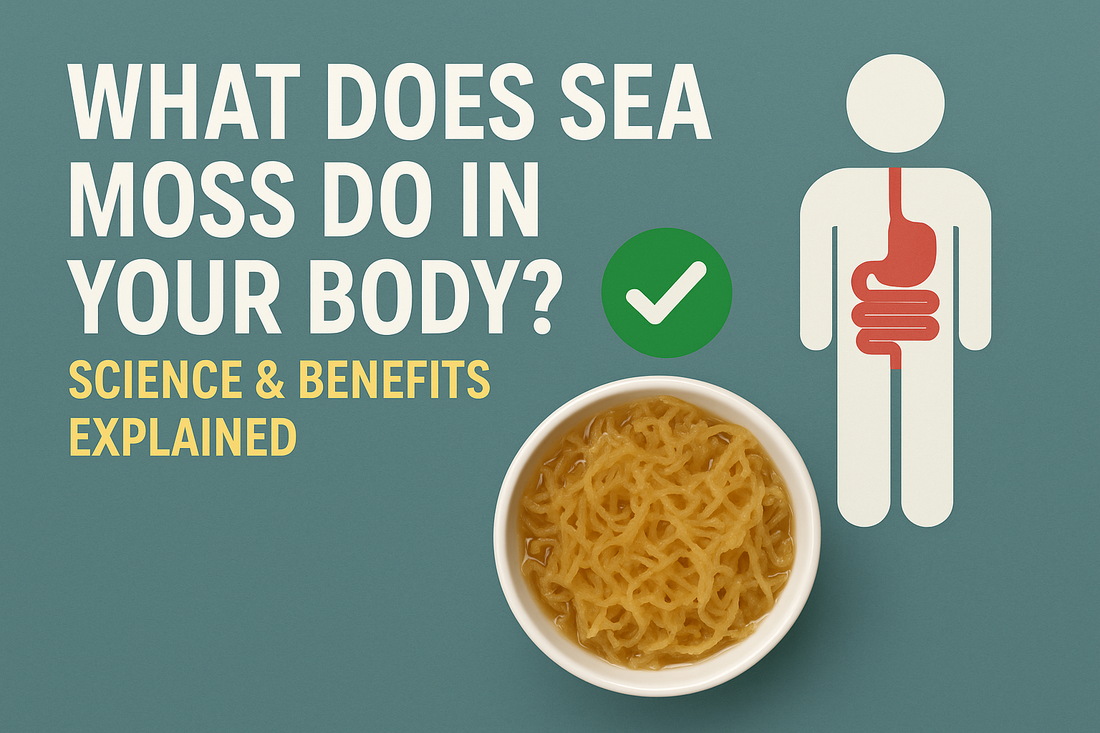Introduction – Why Everyone Is Talking About Sea Moss
Sea moss has become one of the most popular natural supplements in the wellness world. From smoothies to capsules, people are adding this sea vegetable into their diets every day. But what exactly does sea moss do in your body? Does it really live up to the hype, or is it just another health trend?
In this article, we’ll explore the science-backed sea moss benefits, how it works inside your body, and why so many people swear by it.
What Is Sea Moss?
Sea moss, also called Irish moss, is a type of red algae found along the Atlantic coasts of Europe, North America, and the Caribbean. Traditionally, it has been used in soups, tonics, and herbal remedies. Today, it’s sold in gel, powder, and capsule form, making it easy to add to modern diets.
The Nutrients Found in Sea Moss
One of the biggest reasons people turn to sea moss is its impressive nutrient profile.
Vitamins and Minerals
Sea moss contains over 90 essential minerals that your body needs. These include:
-
Iodine (supports thyroid health)
-
Magnesium (relaxes muscles and helps with sleep)
-
Calcium (supports strong bones)
-
Zinc (important for immunity and wound healing)
Antioxidants and Amino Acids
In addition to minerals, sea moss provides antioxidants that help protect cells from damage, as well as amino acids, the building blocks of protein.
What Sea Moss Does in Your Body
So, how do these nutrients actually work once you consume sea moss? Let’s break it down.
Supports Digestion
Sea moss contains a type of fiber called carrageenan, which acts as a prebiotic. It helps feed the good bacteria in your gut, improving digestion and overall gut health.
Boosts Immunity
The high vitamin and mineral content helps strengthen the immune system. In particular, zinc and vitamin C are known to improve your body’s defense against common colds and infections.
Improves Thyroid Function
Because sea moss is rich in iodine, it supports healthy thyroid function. The thyroid controls metabolism, energy levels, and hormone balance.
Science Behind the Benefits
Several studies suggest that sea moss can improve health by:
-
Reducing inflammation
-
Helping regulate cholesterol levels
-
Supporting weight management
While more research is still needed, the early evidence is promising. (For more, see Healthline’s detailed guide).
How Sea Moss Compares to Other Superfoods
Compared to spirulina or chlorella, sea moss has a higher iodine content, making it particularly beneficial for thyroid health. It’s also less earthy in taste, which is why many people prefer it in smoothies.
How to Take Sea Moss Safely
There are several easy ways to add sea moss to your daily routine:
-
Blend the gel into smoothies or juices
-
Add powdered sea moss to teas or soups
-
Take capsules for convenience
Recommended dosage: Most experts suggest 1–2 tablespoons of gel or 500–1000mg of capsules per day.
⚠️ Important: Taking too much sea moss can lead to side effects like iodine overload. Always start small and monitor your body’s response.
Final Thoughts
Sea moss isn’t just a passing health trend — it’s a nutrient-dense sea vegetable that can genuinely improve your health. From boosting digestion to supporting your thyroid and immune system, the benefits of sea moss are wide-ranging.
If you’re considering adding it to your diet, start with a safe dosage and always choose high-quality, organic products.
👉 Next, read about possible Sea Moss Side Effects or explore how it improves Skin & Hair Health.

